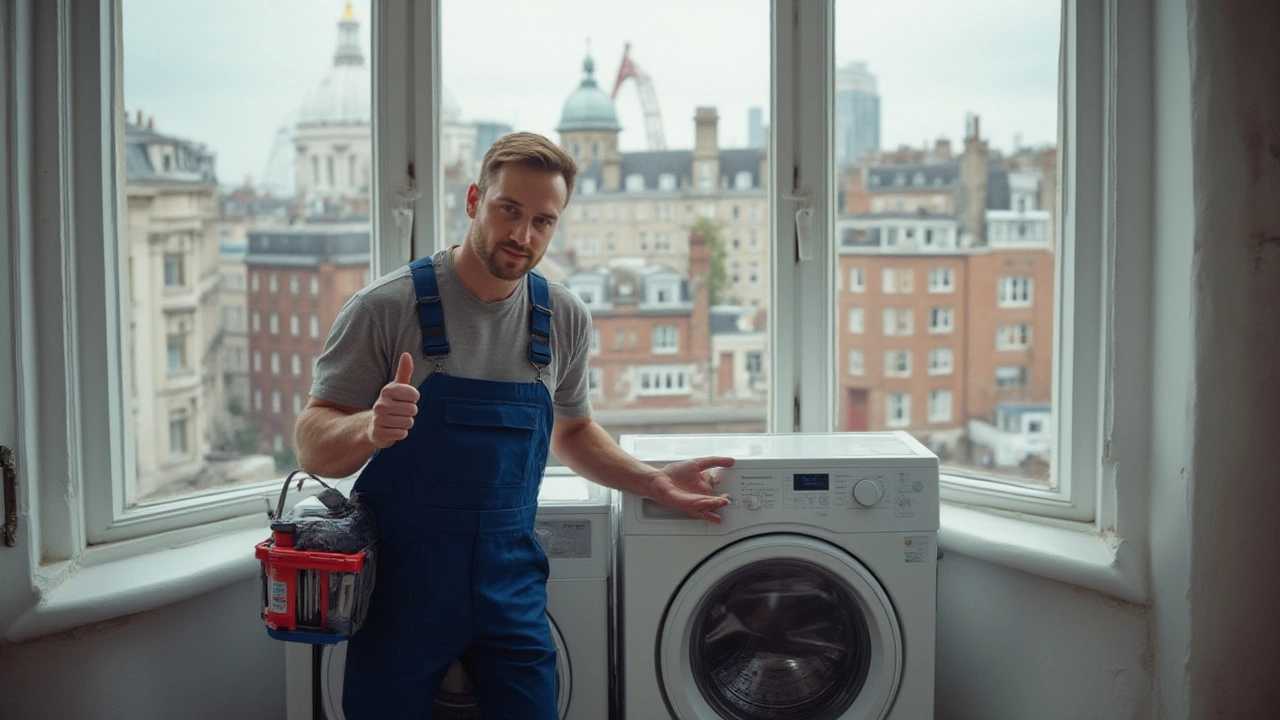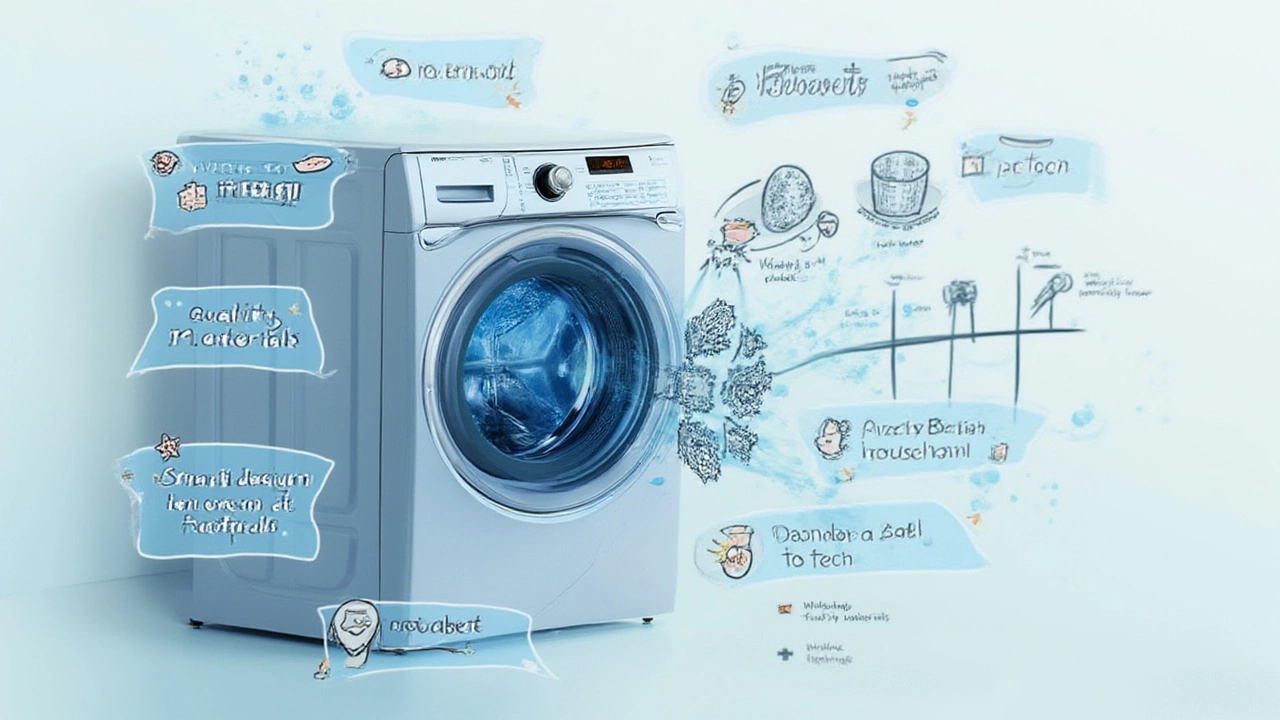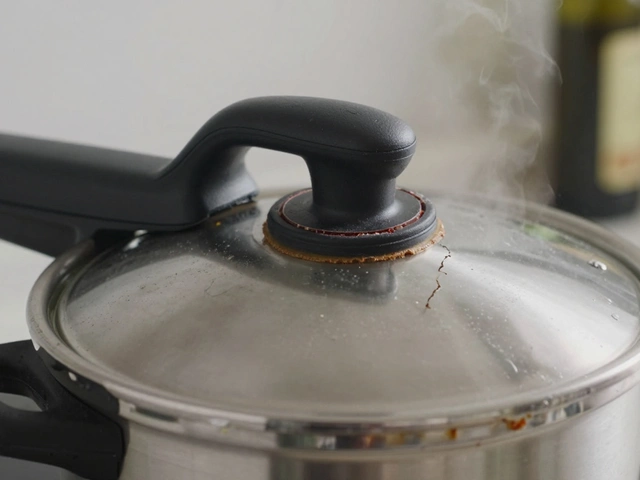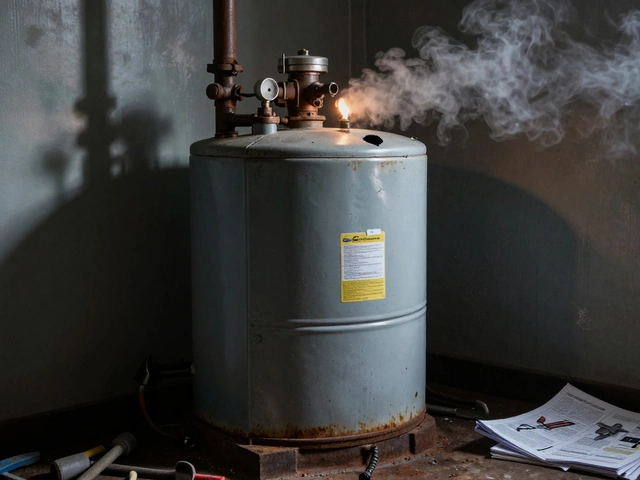The story’s always the same—your washer groans, then thunks, then gives up when you need it most. So, which washer brands won’t leave you elbow-deep in soapy water and frustration? Surprise—it’s not always about the most expensive machine or the flashiest buttons. Some brands are just built tougher, smarter, and with fewer corners cut.
What Makes a Washer Reliable (And Why Most Don’t Cut It)
Washers might all look similar on the surface, but there’s a huge difference in their guts. Reliability is mostly about how well that machine handles stress: heavy loads, off-balance loads, hard water, or your roommate’s soccer jersey emergencies. Brands that focus on simple, time-tested components tend to do better. For instance, direct-drive motors—like the ones on LG and Samsung—last longer than old-school belt drives. Fewer moving parts means fewer things to snap or squeal. But reliable washers aren't just about sturdy motors: smart water sensors also prevent floods, and anti-vibration tech keeps the whole machine from walking across your floor.
What tanks most washers early? Weak pumps, flimsy door latches, or electronics that freak out after a year of laundry room humidity. Lint, coins, and hard water can gunge up pumps. Too many moving plastic parts, especially in cheap off-brand models, crack with normal use. Reliability scores also suffer when manufacturers chase short-term trends—like fancy apps or see-through doors—without sweating the stuff that actually matters, like robust bearings or corrosion-proof drums.
That brings us to serviceability. If a washer can’t be fixed easily, it’s doomed after the first breakdown. This is where brands with widely available spare parts (like Whirlpool) shine bright. Nobody wants to wait two months for a replacement circuit board shipped from halfway across the globe. So: robust parts, simple design, and easy-to-find fixes—that’s what really keeps a washer running past the return period.
The Top Washer Brands With the Fewest Problems
Let’s not tiptoe around it. In 2025, a few brands clearly float to the top of reliability charts again and again. LG holds the crown for the best front-loaders, and it’s not just hype; reliability surveys from Consumer Reports and Yale Appliance show fewer repairs for LG than almost anyone else. Their direct-drive motors live much longer, and their electronics, for the most part, don’t conk out prematurely.
For top-loaders, Speed Queen is the legend. Used in laundromats for ages, Speed Queen machines have thick metal parts—they can survive overloaded spins, kids slamming lids, and even moving house without cracking in two. They’re not flashy, and you won’t find Wi-Fi in some models, but they’ve got the lowest service-call rates in the business. Folks joke these washers are "built like a tank"—and it isn’t an exaggeration.
Whirlpool and its cousin Maytag land close behind. These American classics have millions of units running in homes, and parts are everywhere. If a pump or a knob dies, you can fix it for lunch money. Fewer fancy features means fewer breakdowns. Samsung, while building slick and popular washers, lands a step lower due to nagging electronic quirks—but hardware-wise, they’re strong, especially the direct-drive models.
Here’s a quick breakdown from recent service-data tallies and repair techs on the ground:
- LG — Reliable, quiet, direct-drive motors; great front-loaders; rare control board failures.
- Speed Queen — Commercial-grade build; ultra-simple controls; lowest repair rates for top-loaders.
- Whirlpool/Maytag — Decades of parts support; easy DIY repairs; robust hardware.
- Samsung — Tech-savvy, efficient motors; slightly higher electronic troubles (but getting better each year).
If you’re into numbers, the newest annual reliability surveys show LG and Speed Queen with less than 6% of owners reporting any issue in the first three years. Whirlpool and Maytag hover around 8-9%. Samsung is close behind, mostly hobbled by a small percentage of Wi-Fi and display bugs.

Hidden Factors That Can Make Any Washer Last Longer
Even the best-built washer will flunk out early if you abuse it. Overloading—yeah, those mega-blanket loads—wrecks the drum bearings and stresses the motor. Neglecting to run the self-clean cycle turns modern front-loaders into musty, stinky caves. Hard water leaves mineral crusts on valves and inlets. A huge number of laundry breakdowns are traced back to skipping basics, not bad brands.
Here’s what keeps things rolling:
- Never overload. Stuffing clothes tight strains everything.
- Wipe the door seals weekly, especially on front-loaders. It blocks mildew outbreaks.
- Run a drum-clean or hot wash with a washing machine cleaner once a month.
- Use only high-efficiency, low-suds detergents, and never more than needed.
- If you have hard water, try a water softener (or drop in anti-scale tablets).
- Empty pockets—coins, keys, and screws eat pumps for breakfast.
It’s wild, but half the horror stories on appliance forums could be avoided with just those steps. A survey from Yale Appliance found a dramatic 30% fewer service calls among customers who checked their door seals and ran cleaning cycles each month. Brand matters—but so does basic care.
User Reviews vs. Technician Data: Who Really Knows Best?
It’s tempting to wade through Amazon or Best Buy reviews when you pick a washer, but anecdotes only go so far. Happy buyers don’t always follow up after 8 years of trouble-free use, but when a circuit board fails at three years, you’ll hear a lot of heat online. This makes nasty breakdowns seem way more common than they are—but techs, the folks elbow-deep in washers every week, see the full pattern over thousands of machines. Their data is gold.
Appliance service companies like Yale Appliance regularly publish service-rate data, and places like Consumer Reports survey thousands of people annually on what went wrong. For the past five years, both sources have pointed out LG and Speed Queen as top dogs, with Whirlpool and Maytag just behind. Short warranty claims, part availability, and the speed of service response matter too—and here, Whirlpool’s U.S. production proves its worth: parts can often be shipped overnight.
Techs also call out surprises that online reviews miss. For example, LG’s older gasket design used to leak, but the 2022 update fixed that. They’ll flag chronic errors like Samsung washers occasionally ‘walking’ on uneven floors—something Samsung addressed with better feet in late-2023. Choice really comes down to not just the right brand, but the right model revision.
If you love deep research, check out third-party tracks like Yale’s yearly reliability reports—those aren't sponsored and they crunch thousands of service records. Don’t just trust five-star reviews or Reddit rants. Listen to the repair pros. They don’t sugarcoat what eats up their weekends.

Practical Tips for Choosing a Trouble-Free Washer
Shopping for a washer? It’s easy to get dazzled by features that sound cool but don’t actually buy you peace of mind. Here’s what makes a difference:
- Prioritize models with direct-drive motors—they last longer and are quieter. LG and Samsung do these best.
- Look for machines with metal, not plastic, parts in key stress spots: the tub, hinges, and motor mounts.
- If you want dead-simple reliability and no Wi-Fi headaches, go Speed Queen or Maytag top-loaders.
- Stick with brands that have good local parts support. Whirlpool, Maytag, and Speed Queen nail this.
- Check dimensions and depth! Many new washers are deeper, which can mess with closet installs or pan sizes.
- Don’t let capacity numbers fool you—actual drums can vary a lot. It’s about usable space, not what the sticker says.
- Make sure the model you’re eyeing isn’t an early release with untested tech. Wait a year if you’re unsure—many bugs get ironed out after launch.
Cost-per-load is another angle people ignore. A cheaper washer that guzzles power or eats parts can cost more than a pricier, low-maintenance one over just a couple of years. Energy Star models from LG and Whirlpool save on your bills, and simple top-loaders from Speed Queen are so durable you may never need to replace them.
Here’s a memory that sticks: a customer once told me their old Speed Queen washer survived two cross-country moves, basement floods, and a squirrel somehow making it into the spin drum. Still going, still humming along—ugly as sin, maybe, but loyal. Not all washers will get you birthday cards for decades, but buying with these tips will save you a heap of cash and nerves, and guarantee your socks get clean for years to come.


